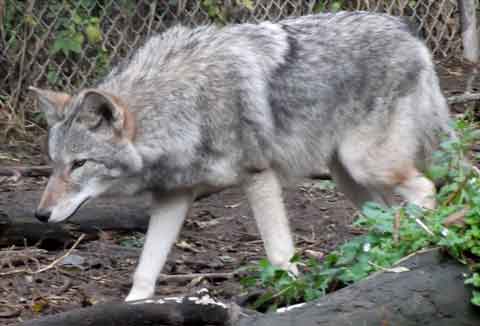Who's afraid of the big, bad coywolf?
Posted by Staff of goGardenNow on

There was a time when wolves were generally feared. They roamed wild across continents. Travelers feared for their own safety. Herders feared for their flocks. As marauders, wolves were ensconced in history, legend, and popular stories.
They were hunted relentlessly. Now these shy and reclusive creatures are seldom encountered, except in remote wilderness areas.
Not so with their relative - the coyote. While shy, coyotes are not so withdrawn, more comfortable with life at the edge of human civilization, or closer.
Sometimes their paths cross. The wolf whistles. The other appears coy and blushes. Animal instincts take over. They are soon the proud parents of little coywolves.
This happens more often than one might expect. It's believed that most of the "coyotes" seen in the eastern North America are actually coywolves. Not only that. They are probably hybrids of wolves, coyotes and domestic dogs (Canis familiaris), and may number in the millions.
Not surprisingly, coywolves will possess characteristics of their parents. This makes them very adaptable and wide-ranging. They've been spotted as far south as Virginia. No doubt their range will increase.
Have you seen a coyote by the road? Did one just cross your yard? It was probably a coywolf.
What is to be done if coywolves have been spotted in your area? Should they be feared? A little research on the internet, and common sense, reveals the following:
- If one crosses your path, give it plenty of space.
- Avoid physical contact. Coywolves are wild animals. As such they can attack, and injure or kill. They can also carry diseases.
- Avoid threatening postures if one crosses your path. Do NOT make eye contact. Do NOT turn and run. DO back away slowly.
- Remove food sources.
- Clean up around dumpsters and trash cans.
- Avoid feeding pets outdoors.
- Secure small or weak farm animals indoors at night, including poultry and young livestock.
- Bring pets indoors at night.
- Supervise children when they're playing outdoors, or have them play in fenced enclosures. Warn youngsters against approaching them.
- Notify animal control authorities.
Be cautious; be safe.
For further reading:
https://en.wikipedia.org/wiki/Coywolf
https://www.smithsonianmag.com/smart-news/coywolves-are-taking-over-eastern-north-america-180957141/
